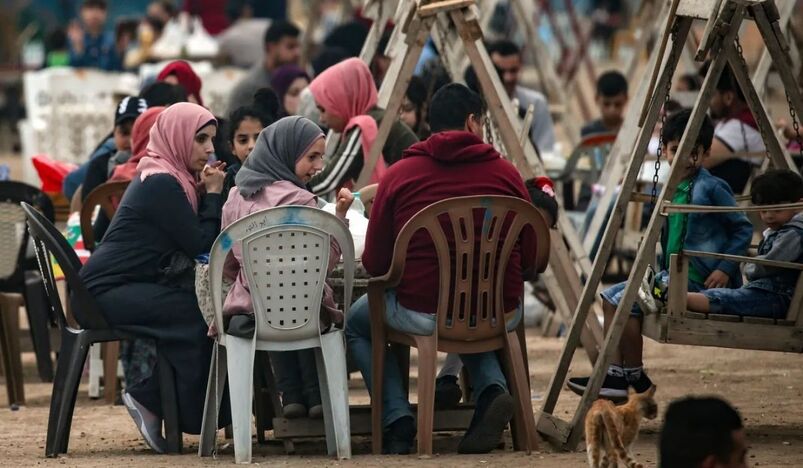
Palestinians gather along the shore of Gaza City to share the iftar meal during Ramadan on May 13, 2020.
During Ramadan, Muslims wake up well before dawn to eat the first meal of the day, which has to last until sunset. This means eating lots of high-protein foods and drinking as much water as possible right up until dawn, after which you can't eat or drink anything.
At dawn, we perform the morning prayer. Since it's usually still pretty early, many go back to sleep for a bit before waking up again to get ready for the day (I certainly do).
Muslims are not supposed to avoid work or school or any other normal duties during the day just because we are fasting. In many Muslim countries, however, businesses and schools may reduce their hours during the day or close entirely. For the most part, though, Muslims go about their daily business as we normally would, despite not being able to eat or drink anything the whole day.
When the evening call to prayer is finally made (or when the alarm on your phone's Muslim prayer app goes off), we break the day's fast with a light meal — really more of a snack — called an iftar (literally "breakfast"), before performing the evening prayer. Many people also go to the mosque for the evening prayer, followed by a special prayer that is only recited during Ramadan.
This is usually followed by a larger meal a bit later in the evening, which is often shared with family and friends in one another's homes throughout the month. Then it's off to bed for a few hours of sleep before it's time to wake up and start all over again.
(Note: There are good reasons for only having a small snack to break your fast before performing the evening prayer and then eating a bigger meal later. Muslim prayers involve a lot of movement — bending over, prostrating on the ground, standing up, etc. Doing all that physical activity on a full stomach after not having eaten for 15 hours is a recipe for disaster. Just trust me on this one.)
Despite the hardship of fasting for a whole month, most Muslims (myself included) actually look forward to Ramadan and are a little sad when it’s over. There’s just something really special about knowing that tens of millions of your fellow Muslims around the world are experiencing the same hunger pangs, dry mouth, and dizzy spells that you are, and that we’re all in it together.
.jpg)
Qatar Secures Place Among the World's Top 10 Wealthiest Nations
.jpg)
Hamad International Airport Witnesses Record Increase in Passenger Traffic

Saudi Arabia: Any visa holder can now perform Umrah

What are Qatar's Labour Laws on Annual Leave?
Leave a comment